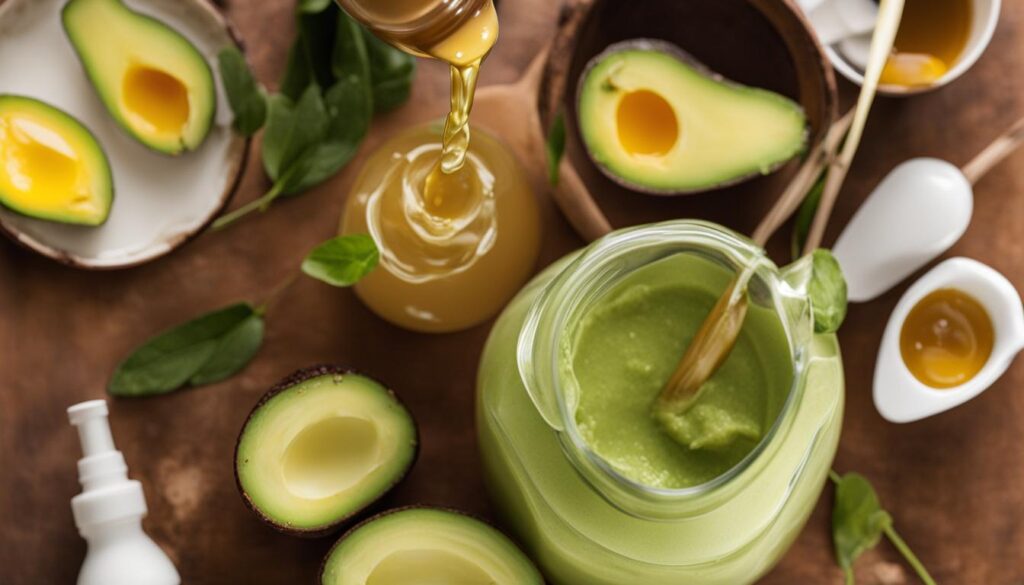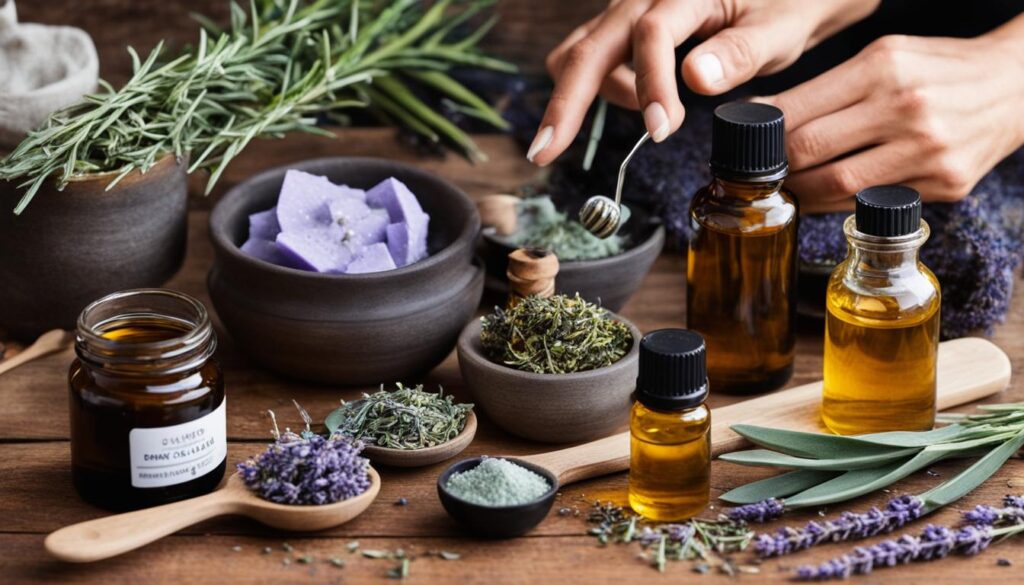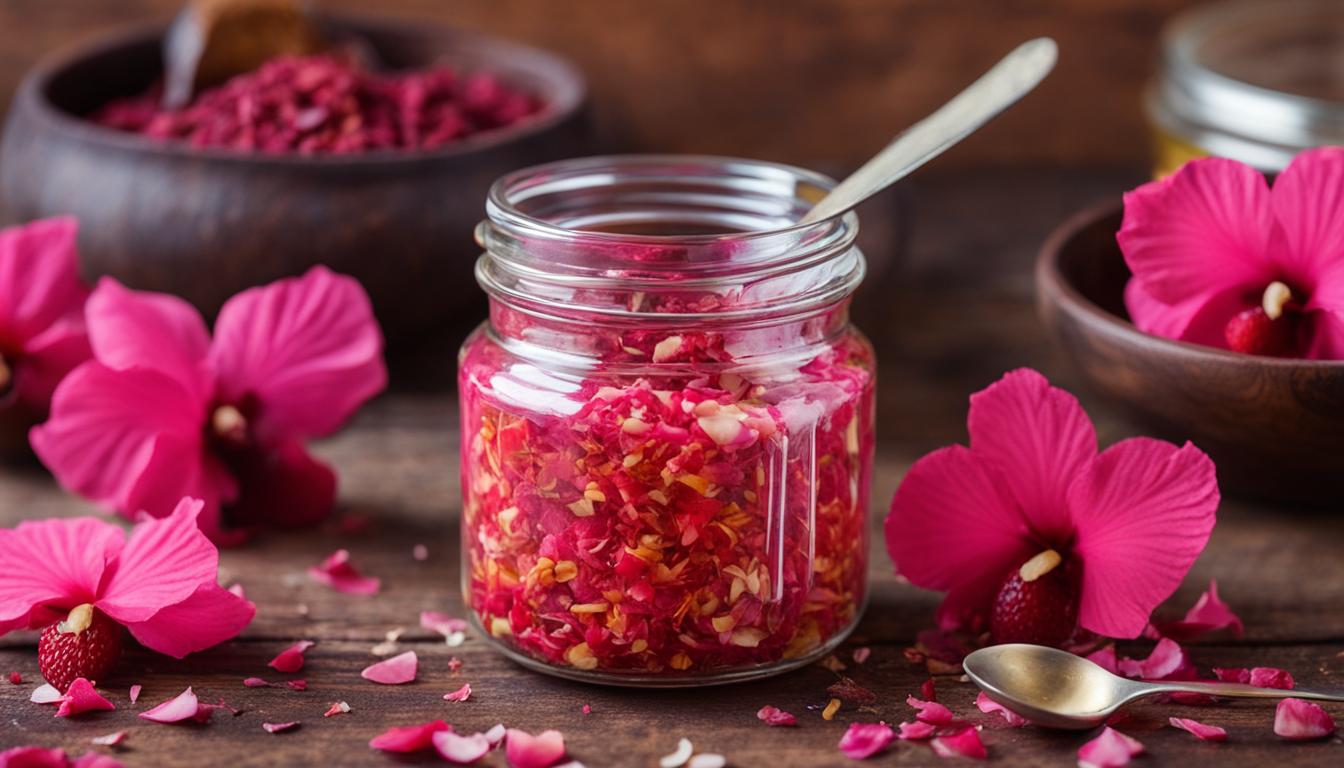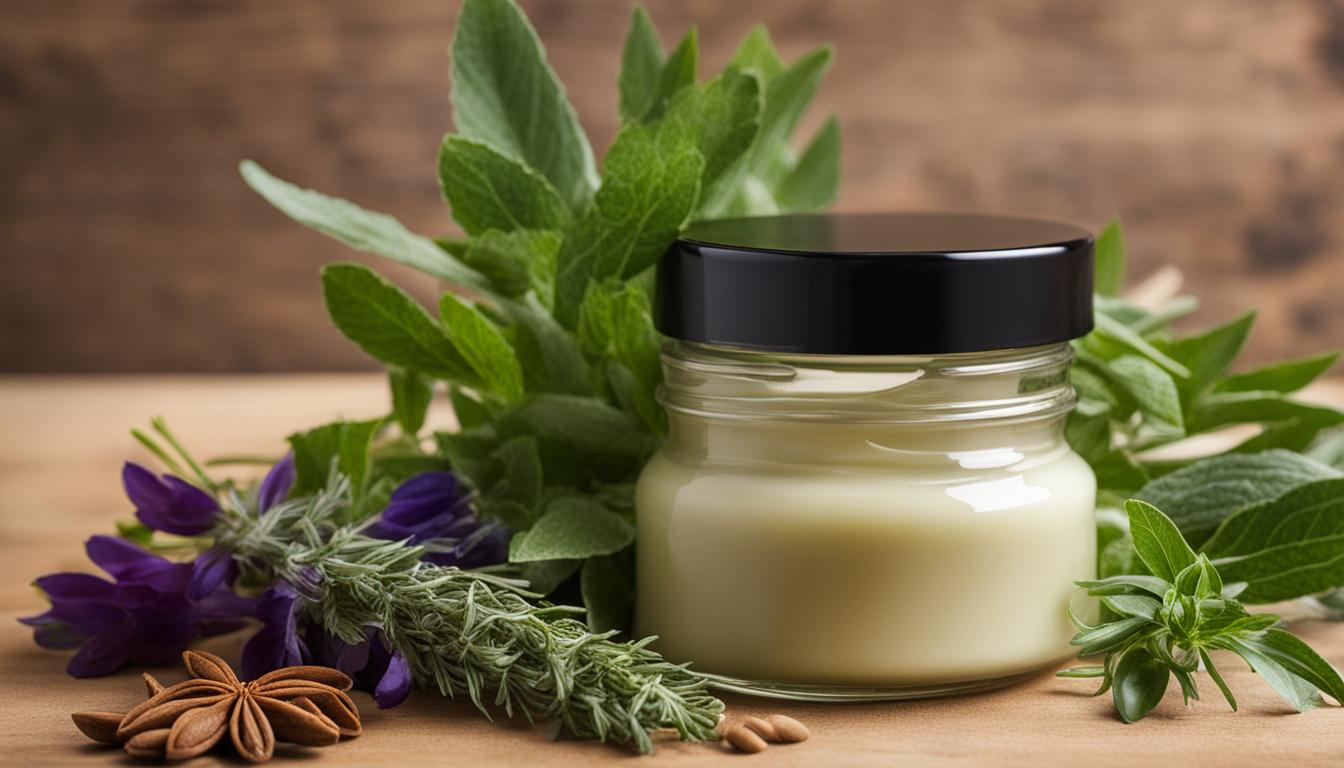Making your own natural shampoo at home can be an easy and cost-effective way to care for your hair. With the right ingredients and recipes, you can create nourishing shampoos that are free from harsh chemicals. In this article, I will guide you on how to make shampoo at home using natural ingredients, providing you with various homemade shampoo recipes to suit different hair types and needs.
Key Takeaways:
- Learn how to make shampoo at home with natural ingredients.
- Discover the benefits of homemade shampoo for your hair and the environment.
- Find basic homemade shampoo recipes that suit all hair types.
- Explore shampoo recipes tailored to specific hair types and needs.
- Discover natural shampoo alternatives to commercial products.
The Importance of Natural Shampoo
Natural shampoos have gained immense popularity in recent years for their numerous benefits in promoting healthy hair. Unlike commercial shampoos that often contain harsh detergents and synthetic fragrances, natural shampoos are made with gentle ingredients that are not only better for your hair but also environmentally friendly. By choosing natural shampoo, you can enjoy various advantages that contribute to scalp health, prevent dryness, and promote shinier and more vibrant hair.
Natural Shampoo Benefits
- Reduces scalp irritation and inflammation
- Avoids the harmful effects of harsh chemicals and synthetic fragrances
- Helps maintain the natural pH balance of the scalp
- Nourishes and strengthens hair follicles
- Promotes healthier and shinier hair
“Using natural shampoo means embracing a hair care routine that is gentler on your hair and scalp. It allows you to cleanse your hair without stripping away its natural oils, resulting in healthier, more balanced hair.”
Advantages of Homemade Shampoo
Homemade shampoos offer additional advantages beyond just being natural. By making your own shampoo, you have full control over the ingredients, ensuring that you use only the best for your hair. This allows you to customize your shampoo according to your specific hair type, addressing individual concerns such as dryness, oiliness, or sensitivity. Homemade shampoos can also be cost-effective, as many natural ingredients are readily available and more affordable than commercial options.
Why Choose Natural Shampoo?
Choosing natural shampoo is a conscious decision to prioritize your hair and scalp health. By opting for natural ingredients, you are avoiding potential irritants and toxins that may have negative long-term effects on your hair. Natural shampoos treat your hair more gently, preserving its moisture and natural shine. In addition, natural shampoo is an eco-friendly choice, as it reduces water pollution and waste from chemical-laden commercial shampoos.

| Advantages of Natural Shampoo | Advantages of Homemade Shampoo | Reasons to Choose Natural Shampoo |
|---|---|---|
| Gentle on the scalp | Customizable for specific hair types | Avoids harmful chemicals |
| Prevents scalp irritation | Cost-effective | Preserves hair’s moisture and shine |
| Promotes healthier, shinier hair | Allows control over ingredients | Reduces environmental impact |
Basic Homemade Shampoo Recipe
Are you new to making your own hair care products? A basic homemade shampoo recipe is the perfect starting point. This simple DIY shampoo can be crafted using a few key ingredients, resulting in a gentle cleanse that is suitable for all hair types. Let’s dive into the recipe:
Ingredients:
- Liquid castile soap – ¼ cup
- Water – ¾ cup
- Oil (such as coconut, olive, or almond) – 1 teaspoon
Instructions:
- In a container, mix the liquid castile soap and water together. Stir well to combine.
- Add the oil of your choice to the mixture. This will provide extra moisture to your hair.
- Give the shampoo a gentle stir to ensure all the ingredients are thoroughly blended.
Your basic homemade shampoo is now ready to use! This recipe provides a nourishing cleanse without stripping your hair of its natural oils. It’s a simple and effective alternative to commercial shampoos that may contain harsh chemicals.
Tip: You can customize your homemade shampoo by adding a few drops of your favorite essential oil for fragrance. Lavender, rosemary, or peppermint are popular choices that also offer additional benefits for your hair and scalp.
Remember, it’s essential to experiment and find what works best for your hair. While this basic recipe is a great starting point, you may choose to tweak it by adding other natural ingredients that complement your hair’s specific needs. Now, let’s move on to exploring shampoo recipes tailored for different hair types in the following section.
| Hair Type | Additional Ingredients |
|---|---|
| Dry Hair | Aloe vera gel, glycerin |
| Oily Hair | Tea tree oil, peppermint oil |
| Sensitive Scalp | Chamomile infusion |
By customizing your homemade shampoo recipe according to your hair type, you can address specific concerns and achieve optimal results.

Now that you have a basic homemade shampoo recipe, it’s time to explore options specifically designed for different hair types. The upcoming section will provide you with valuable recipes tailored to address the unique needs of dry, oily, and sensitive scalp hair. Stay tuned!
Shampoo Recipes for Specific Hair Types
Different hair types require different care, and natural shampoo recipes can be tailored to address specific needs. Whether you have dry hair, oily hair, or a sensitive scalp, there are homemade shampoo alternatives that can help you achieve healthier and more balanced hair.
1. Homemade Shampoo for Dry Hair
If you have dry hair that lacks moisture, incorporating ingredients like aloe vera gel and glycerin into your shampoo recipe can provide the hydration and nourishment your hair needs. These natural moisturizers help to replenish moisture and restore shine, leaving your hair soft and manageable.
Try this simple recipe:
| Ingredients: | Instructions: |
|---|---|
| – 1/2 cup liquid castile soap | 1. In a bowl, combine the liquid castile soap, aloe vera gel, and glycerin. |
| – 1/4 cup aloe vera gel | 2. Mix well until all ingredients are blended. |
| – 1 tablespoon vegetable glycerin | 3. Transfer the mixture to a bottle or container for storage. Your homemade shampoo for dry hair is ready to use! |
2. Shampoo Recipe for Oily Hair
For those with oily hair, using a natural shampoo that helps regulate oil production can be beneficial. Tea tree and peppermint essential oils are known for their balancing properties and can help control excess oil on the scalp. These oils also provide a refreshing sensation, leaving your hair feeling clean and revived.
Here’s an easy recipe to try:
| Ingredients: | Instructions: |
|---|---|
| – 1/2 cup liquid castile soap | 1. In a bowl, combine the liquid castile soap and tea tree oil. |
| – 10 drops tea tree essential oil | 2. Add the peppermint essential oil and mix well. |
| – 5 drops peppermint essential oil | 3. Transfer the mixture to a bottle or container. Your homemade shampoo for oily hair is ready to use! |
3. Natural Shampoo for Sensitive Scalp
If you have a sensitive scalp that easily gets irritated, using a gentle and soothing shampoo can help alleviate discomfort. Chamomile-infused shampoo is a great option as chamomile has calming properties that can reduce scalp inflammation and itching.
Here’s a recipe to make your own chamomile-infused shampoo:
| Ingredients: | Instructions: |
|---|---|
| – 1/2 cup liquid castile soap | 1. In a small saucepan, bring water to a boil. |
| – 1/4 cup dried chamomile flowers | 2. Remove the saucepan from heat and add the dried chamomile flowers. |
| – 1 tablespoon vegetable glycerin | 3. Let the mixture steep for about 30 minutes and strain out the chamomile flowers. |
| – 1 cup water (boiling) | 4. In a bowl, combine the chamomile-infused water with the liquid castile soap and glycerin. |
| – 10 drops chamomile essential oil (optional) | 5. Mix well and transfer the mixture to a bottle or container for storage. Your natural shampoo for sensitive scalp is now ready to use! |
These homemade shampoo recipes are just a starting point, and you can adjust the ingredients to suit your specific hair type and preferences. Experiment with different combinations and essential oils until you find the perfect formula that nourishes your hair and keeps it looking its best.

Natural Shampoo Alternatives
If you’re looking for alternatives to traditional liquid shampoo, there are several options to consider. DIY shampoo bars and the no-poo method offer unique alternatives to commercial shampoos.
DIY Shampoo Bars

DIY shampoo bars have gained popularity for their convenience and natural ingredients. These solid bars can be made with nourishing ingredients like coconut oil, shea butter, and essential oils. They are used similarly to regular soap, lathering up when applied to wet hair. Shampoo bars provide a plastic-free, zero-waste alternative to liquid shampoos, making them environmentally friendly. Additionally, they are travel-friendly and can last longer than traditional liquid shampoos.
The No-Poo Method
The no-poo method involves avoiding commercial shampoo altogether and adopting alternative cleansing methods. Instead of using shampoo, individuals following the no-poo method rely on natural ingredients like baking soda, apple cider vinegar, or herbal rinses to cleanse their hair. These alternatives help to remove dirt and excess oil while maintaining the natural balance of the scalp. The no-poo method can be beneficial for those with sensitive scalps or hair that may be easily stripped of its natural oils by commercial shampoos.
“DIY shampoo bars and the no-poo method offer natural alternatives to commercial shampoos, promoting sustainable hair care and reducing exposure to potentially harmful ingredients.” – [Your Name]
By exploring these natural shampoo alternatives, you can find a hair care routine that suits your needs while minimizing your impact on the environment and reducing exposure to chemicals.
Tips for Using Homemade Shampoo
Making the switch from commercial shampoo to homemade alternatives requires some adjustments. Here are some tips to help you make the most of your natural shampoo and transition smoothly:
1. Adjusting to Less Lather
One thing to keep in mind is that natural shampoos may not lather as much as commercial ones due to the absence of foaming agents. Don’t worry, though! Just because there’s less lather doesn’t mean your homemade shampoo isn’t working. It’s still cleansing your hair effectively.
2. Follow Up with Natural Conditioner
After each wash, it’s recommended to use a natural conditioner to provide extra moisture and nourishment to your hair. Natural conditioners help detangle and soften your hair, leaving it silky and manageable.
3. Be Patient with the Transition
Allow your hair some time to adjust to the new routine. It may take a few washes for your hair to adapt to the absence of harsh chemicals found in commercial shampoos. Be patient, and don’t give up too quickly. It’s normal for the transition period to vary from person to person.
4. Explore Different Recipes and Methods
Every individual’s hair is unique, so it’s worth experimenting with different homemade shampoo recipes and methods to find what works best for you. You may need to adjust the proportions of ingredients or try different combinations to achieve the desired results. There are various resources available online with countless homemade shampoo recipes for different hair types and concerns.

Transitioning to homemade shampoo is a rewarding journey that allows you to take control of the ingredients you use on your hair. By following these tips and being open to experimentation, you can enjoy the benefits of natural hair care and achieve healthier, more nourished locks.
Enhancing Homemade Shampoo
Homemade shampoo can be easily customized and enhanced by adding various natural ingredients. To thicken the consistency, arrowroot powder or oat flour can be incorporated into the recipe. Baking soda or vegetable glycerin can also help to add thickness and lather. Essential oils such as lavender, rosemary, and tea tree can be added for their hair-strengthening and nourishing properties. These enhancements can further improve the effectiveness of your homemade shampoo.
Enhancements for Homemade Shampoo
| Ingredient | Benefit |
|---|---|
| Arrowroot powder | Thickens consistency |
| Oat flour | Provides thickness |
| Baking soda | Enhances lather |
| Vegetable glycerin | Increases thickness and lather |
| Lavender essential oil | Strengthens hair and provides a pleasant scent |
| Rosemary essential oil | Nourishes the scalp and promotes hair growth |
| Tea tree essential oil | Has antibacterial properties and helps address scalp issues |

Maintaining Hair and Scalp Health
Using natural shampoo is just one part of maintaining overall hair and scalp health. To ensure the vitality of your hair, it’s important to follow a comprehensive hair care routine that encompasses various aspects. Here are some essential tips to help you maintain healthy hair and address common scalp issues:
- Regular Trimming: Regular haircuts help to prevent split ends and breakage, promoting healthier hair growth. Aim to trim your hair every 6-8 weeks to maintain its quality and prevent the appearance of damaged ends.
- Avoid Heat Styling: Excessive use of heat styling tools such as flat irons, curling irons, and blow dryers can cause damage to your hair. Minimize their usage and opt for heat-free hairstyles whenever possible to preserve the natural strength and shine of your hair.
- Protect from UV Damage: Protect your hair from harmful UV rays by wearing a hat or using hair products that contain SPF. UV exposure can lead to dryness, color fading, and brittleness, so shield your hair whenever you’re spending time outdoors.
In addition to these general hair care practices, incorporating scalp treatments with natural remedies can be beneficial for addressing specific scalp issues. Here are a few natural remedies you can try:
- Apple Cider Vinegar (ACV) Rinses: ACV rinses can help balance the pH of your scalp, reducing dandruff and promoting a healthier scalp. Dilute ACV with water and use it as a final rinse after shampooing your hair.
- Essential Oil Massages: Massaging your scalp with essential oils like tea tree oil, lavender oil, or peppermint oil can stimulate blood circulation and promote a healthy scalp. Mix a few drops of your chosen essential oil with a carrier oil like coconut oil and massage it into your scalp.
By incorporating these hair care tips and natural scalp remedies into your routine, you can maintain the health and vitality of your hair while addressing common scalp issues.

Comparison of Natural Remedies for Scalp Issues
| Remedy | Benefits |
|---|---|
| Apple Cider Vinegar (ACV) Rinses | • Balances scalp pH • Reduces dandruff • Soothes scalp irritation |
| Tea Tree Oil Scalp Massage | • Stimulates blood circulation • Anti-inflammatory properties • Fights fungal infections |
| Lavender Oil Scalp Massage | • Calms and reduces scalp inflammation • Promotes relaxation • Nourishes hair follicles |
| Peppermint Oil Scalp Massage | • Cooling sensation • Increases blood flow to the scalp • Stimulates hair growth |
Longevity and Storage of Homemade Shampoo
When it comes to homemade shampoo, it’s important to consider its shelf life and proper storage to maintain its effectiveness and prevent spoilage. Unlike commercial products that often contain preservatives, homemade shampoo relies on natural ingredients, making it more susceptible to bacterial growth and degradation over time. Here are some key points to keep in mind:
Shelf Life of Homemade Shampoo
The shelf life of homemade shampoo is typically shorter compared to commercial shampoos. Without preservatives, natural ingredients can begin to break down and lose their effectiveness after a certain period. The exact shelf life can vary depending on the specific ingredients used, but generally, homemade shampoo can last for about 1-3 months.
To ensure freshness and efficacy, it’s best to prepare smaller batches of homemade shampoo. This way, you can use it within its optimal period and avoid wastage. Regularly check the appearance and smell of your homemade shampoo to assess if it’s still suitable for use.
Proper Storage of Homemade Shampoo
Storing homemade shampoo correctly is essential to maintain its quality and extend its shelf life. Follow these guidelines:
- Use airtight containers: Transfer your homemade shampoo into clean, airtight containers to keep out air, moisture, and contaminants. Glass or plastic containers with tight-fitting lids are ideal for preserving the integrity of the shampoo.
- Keep in a cool, dark place: Store your homemade shampoo in a cool and dark location, away from direct sunlight. Heat and light can accelerate the degradation of the natural ingredients, reducing the effectiveness of the shampoo.
By ensuring proper storage, you can maximize the longevity of your homemade shampoo and maintain its efficacy for a longer period.
Natural Preservatives for Homemade Shampoo
If you want to extend the shelf life of your homemade shampoo, you can consider adding natural preservatives. While they may not provide the same degree of preservation as synthetic preservatives, they can help inhibit the growth of bacteria and extend the usability of your shampoo.
Note: It’s essential to research and understand the properties and usage guidelines of natural preservatives before incorporating them into your homemade shampoo recipe.
One example of a natural preservative commonly used in homemade cosmetics is Linatural® Cosmetics Preservative. It is a broad-spectrum preservative derived from naturally occurring compounds and can help prevent the growth of harmful microorganisms in your homemade shampoo.
Homemade Shampoo Storage Tips Summary
| Storage Tips | Details |
|---|---|
| Use airtight containers | Avoid exposure to air, moisture, and contaminants. |
| Keep in a cool, dark place | Away from direct sunlight and heat sources. |
| Add natural preservatives (optional) | Consider using natural preservatives like Linatural® Cosmetics Preservative to extend shelf life. |
Following these storage guidelines will help ensure that your homemade shampoo remains fresh, effective, and safe to use throughout its lifespan.
Additional Uses for Natural Shampoo
Homemade shampoo is not limited to just hair care. It can be repurposed for various alternative uses, making it a versatile and multi-functional product.
1. Homemade Shaving Cream
Instead of using commercial shaving creams that may contain synthetic ingredients and irritants, homemade shampoo can serve as a natural and nourishing shaving cream alternative. Its gentle, moisturizing properties create a smooth barrier for a close and clean shave, while being kind to the skin.
2. Natural Shampoo for Pets
Homemade shampoo recipes that are free from harsh chemicals and fragrances can be gentle enough for use on pets. This provides a natural and safe option for their hygiene needs, ensuring that their fur and skin receive the same benefits of using natural ingredients.
“Homemade shampoo can be repurposed as a natural and nourishing shaving cream alternative, and it’s gentle enough for use on pets.”
By exploring these additional uses for homemade shampoo, you can maximize its value, making it even more economical and eco-friendly.
| Alternative Uses for Homemade Shampoo |
|---|
| Homemade Shaving Cream |
| Natural Shampoo for Pets |
As shown in the table above, homemade shampoo can be utilized in various ways beyond hair care. It provides a sustainable and natural alternative for both personal grooming and pet care needs.
Resources for Essential Oils and Ingredients
Creating your own homemade shampoo requires sourcing the necessary ingredients. Here are some reliable resources where you can find essential oils and natural ingredients to make your DIY shampoo:
1. Reputable Essential Oil Retailers
- Plant Therapy: A trusted online retailer that offers a wide selection of high-quality essential oils for various purposes. Visit their website at www.planttherapy.com.
- Rocky Mountain Oils: Known for their pure and sustainable essential oils, Rocky Mountain Oils provides a range of options for your homemade shampoo. Explore their collection at www.rockymountainoils.com.
2. Health Food Stores
You can find natural ingredients such as liquid castile soap, aloe vera gel, and glycerin at your local health food stores. These establishments often carry a variety of organic and natural products suitable for homemade shampoo recipes.
3. Online Suppliers
- Mountain Rose Herbs: An online supplier specializing in organic herbs, spices, and botanical ingredients. They offer a range of natural shampoo supplies and essential oils. Explore their offerings at www.mountainroseherbs.com.
- Bulk Apothecary: A one-stop-shop for all your DIY shampoo needs, Bulk Apothecary offers a wide range of natural ingredients, including essential oils, carrier oils, and soap bases. Find what you need at www.bulkapothecary.com.
By utilizing these resources, you can easily obtain the high-quality ingredients required to create your own natural shampoo at home.
Final Thoughts on DIY Natural Shampoo
Making your own natural shampoo is a game-changer for your hair care routine. Not only is it cost-effective, but it also gives you complete control over the ingredients that come into contact with your hair and scalp. By embracing a natural hair care routine and using homemade shampoo, you can promote healthier hair and reduce your exposure to potentially harmful chemicals found in commercial products.
One of the great benefits of making your own shampoo is the ability to experiment with different recipes and create personalized formulas that suit your hair’s specific needs. Whether you have dry, oily, or sensitive hair and scalp, there’s a homemade shampoo recipe out there for you. Adjusting the ingredients and experimenting with essential oils can help you achieve the desired results, whether it’s hydrating and nourishing dry hair, regulating oil production in oily hair, or soothing a sensitive scalp.
Embracing a natural hair care routine goes beyond just making your own shampoo. It’s about adopting a holistic approach to hair care, using natural ingredients, and avoiding harsh chemicals. In addition to homemade shampoo, consider incorporating other natural remedies and practices like regular trimming, avoiding heat styling tools, and protecting your hair from UV damage. Scalp treatments using ingredients like apple cider vinegar or essential oils can also address common issues like dandruff or dryness.
So, why not take the plunge and embrace the benefits of making your own shampoo? Enjoy the process of creating your personalized formulations, experiment with different ingredients, and reap the rewards of a more sustainable and nourishing hair care routine. Your hair and scalp will thank you!
FAQ
Can I make shampoo at home using natural ingredients?
Yes, making your own natural shampoo at home is an easy and cost-effective way to care for your hair. With the right ingredients and recipes, you can create nourishing shampoos that are free from harsh chemicals.
What are the benefits of using natural shampoo?
Natural shampoos are made with gentle ingredients that are better for both the hair and the environment. They can help reduce scalp irritation, prevent dryness, and promote healthier, shinier hair compared to commercial shampoos that often contain harsh detergents and synthetic fragrances.
What is a basic homemade shampoo recipe?
A basic homemade shampoo recipe typically involves mixing liquid castile soap with water and adding a small amount of oil for added moisture. This simple DIY shampoo is suitable for all hair types and can be customized with the addition of essential oils for fragrance.
Are there homemade shampoo recipes for specific hair types?
Yes, different hair types require different care. For dry hair, adding moisturizing ingredients like aloe vera gel and glycerin to the basic shampoo recipe can help hydrate and nourish the hair. For oily hair, tea tree and peppermint essential oils can be added to regulate oil production. Those with a sensitive scalp can benefit from chamomile-infused shampoo that has soothing properties.
What are the alternatives to traditional liquid shampoo?
If you’re looking for alternatives to traditional liquid shampoo, you can consider DIY shampoo bars, which are solid bars made with natural ingredients and used like regular soap for the hair. Another option is the no-poo method, which involves avoiding shampoo altogether and using alternative cleansing methods like apple cider vinegar rinses.
What tips should I follow when using homemade shampoo?
When using homemade shampoo, keep in mind that natural shampoos may not lather as much as commercial ones due to the absence of foaming agents. It is also recommended to follow up with a natural conditioner after each wash for added moisture. Additionally, allow your hair to adjust to the new routine, as it may take time to find the right recipe and method that works best for your hair.
How can I enhance my homemade shampoo?
You can enhance your homemade shampoo by adding various natural ingredients. To thicken the consistency, incorporate arrowroot powder or oat flour into the recipe. Baking soda or vegetable glycerin can also add thickness and lather. Essential oils like lavender, rosemary, and tea tree can be added for their hair-strengthening and nourishing properties.
How can I maintain hair and scalp health?
In addition to using natural shampoo, it’s important to follow a healthy hair care routine that includes regular trimming, avoiding heat styling tools, and protecting the hair from UV damage. Incorporating scalp treatments with natural remedies like apple cider vinegar rinses or essential oil massages can also help address common issues such as dandruff or dryness.
How long does homemade shampoo last and how should it be stored?
Homemade shampoo typically has a shorter shelf life compared to commercial products due to the absence of preservatives. It is important to store homemade shampoo in airtight containers and keep them in a cool, dark place to prevent spoilage. Adding natural preservatives like Linatural Cosmetics Preservative can extend the shelf life. To ensure freshness and avoid waste, it is advisable to prepare smaller batches of homemade shampoo.
Can natural shampoo be used for purposes other than hair care?
Yes, homemade shampoo can be versatile and used for purposes beyond hair care. It can serve as a natural alternative to shaving cream, providing a smooth and nourishing barrier for a clean shave. Some homemade shampoo recipes can also be gentle enough to be used on pets, providing a natural and safe option for their hygiene needs.
Where can I source essential oils and other ingredients for homemade shampoo?
Essential oils can be purchased from reputable retailers like Plant Therapy or Rocky Mountain Oils. Natural ingredients like liquid castile soap, aloe vera gel, and glycerin can be found at health food stores or ordered online from suppliers such as Mountain Rose Herbs or Bulk Apothecary.
What are the benefits of making your own natural shampoo?
Making your own natural shampoo allows you to have full control over the ingredients that come into contact with your hair and scalp. By embracing a natural hair care routine and using homemade shampoo, you can promote healthier hair and reduce your exposure to potentially harmful chemicals.






